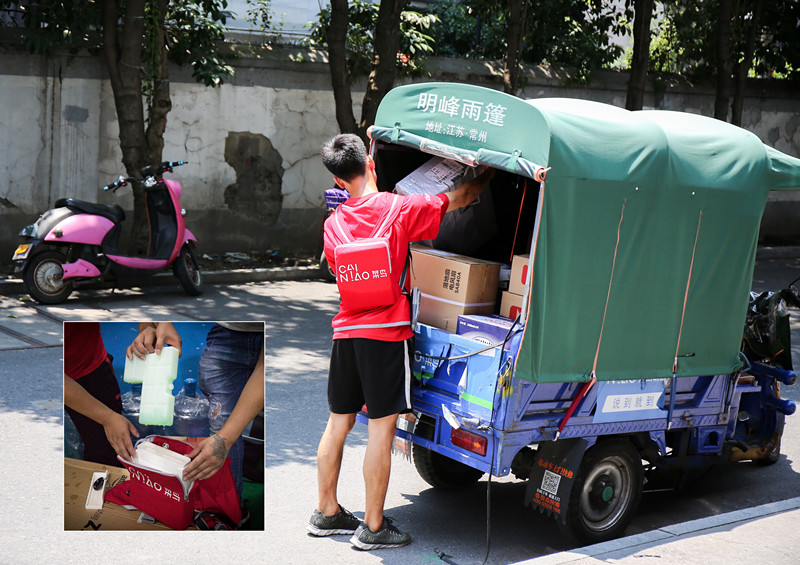For courier, fast-moving job gets even harder on hot days
By LI WENFANG/HU YINGXIA | China Daily | Updated: 2018-08-09 07:17

In the steaming summer heat of subtropical Guangzhou, Guangdong province, Mo Changli starts his daily package delivery job in the morning with 1.5 liters of bottled water at hand.
Then he sorts courier parcels in the west-facing open-door station of his company, a task that is nothing short of smothering, despite the whirring electric fans fixed on the wall.
"It's like a food steamer, and I have to move fast to get the couriers ready. I feel like a hot dog and I drink from the big bottle," he said.
After loading the parcels onto his electric tricycle, he heads out for his first delivery. The maximum air temperature in midsummer in this southern city usually ranges from 35 C to 37 C, but with the high humidity, it feels even hotter.
Mo covers part of the business-heavy Tianhe district and delivers 100 parcels a day on average. A tricycle load can weigh up to 150 kilograms, with all manner of goods, from pet food and clothes to printed documents, packaged food and laundry detergent.
Office buildings are preferred for delivery because they have air conditioning. Residential buildings are more difficult: Some of them have no elevator, and those that do may not have air conditioning.
"I delivered more than 10 kilograms of pet food to a woman on the seventh floor the other day. She insisted I take it to her home and only came down to show me the way and help me carry the parcel after I climbed six stories," he said. "I don't like such deliveries. It was very hot and my T-shirt was soaked when I finished. I grabbed a soft drink to cool down a bit."
Heavier items may include computer desks and sofas, with a sofa barely fitting into an elevator and delivered without assistance.
Mo doesn't like to wear his short-sleeved uniform, which breathes poorly, but the colors of his shirt and pants, soaked with sweat, fade quickly.
His 500-yuan ($74) sport shoes wear out in half a year, with around 19,000 steps every day. Additional cold drinks are necessary during brief breaks.
During summer downpours, Mo carries an umbrella to shield himself and his bag of parcels. But for large items, he has to seek shelter and wait for the rain to stop.
He cannot afford to wait too long because he is required to deliver at least 90 percent of the morning load by 1 pm.
The tight schedule leaves Mo little time for calling recipients, many of whom are not at home at delivery time.
In such cases-and no space available in the security guard room or the self-service courier cabinet in the community-Mo leaves parcels on the recipients' doorsteps, risking the loss of the parcels, which would mean a loss for him.
He gets bruises sometimes on his knee or elbow when moving parcels.
"I'm from a small community. I don't say much about hardship," said Mo, who is in his 20s. He's a native of Qingyuan, north of Guangzhou. A few of his co-workers at the station are around 50 years old.
Parcels for delivery have increased significantly for his company, which went public in late 2015, thanks to the ever-growing enthusiasm for online shopping, he said.
Hu Yingxia contributed to this story.
























